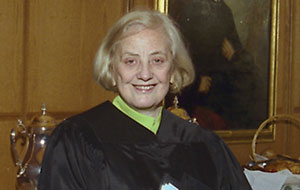
Wall Street trailblazer and Case Western Reserve honorary alumna Muriel “Mickie” Siebert, known as the “first woman of finance,” died Aug. 24 from complications due to cancer. She was 84.
Born in Cleveland in 1928, Siebert began her college career at Flora Stone Mather College for Women, now part of Case Western Reserve University, but left after only two years when her father fell ill.
She moved to New York City in 1954 and worked at numerous brokerage firms, leaving each position after learning that men doing the same work were paid significantly more. She recalled in her autobiography Changing the Rules: “I had a dream of earning the same pay as my male colleagues. So I asked a friend what large firm would pay me equally, and he said that the only way it could happen was if I bought my own seat on the New York Stock Exchange.”
Siebert forged ahead with that plan and purchased her seat on the exchange, but not without a fight. Siebert first rallied her colleagues to sponsor her application, but nine out of 10 turned her down.
As a newly created condition, the exchange insisted that Siebert obtain bank loan offers to cover the record-breaking $445,000 seat price before considering her application. But banks weren’t willing to lend her the money before she was admitted to the exchange. It was another two years before Siebert secured the loan from Chase Manhattan, and on Dec. 28, 1967, Siebert was elected the first woman on the New York Stock Exchange.
Siebert remained the only woman among more than 1,300 men on the exchange for almost 10 years, a testament to the seemingly glacial pace of changing discriminatory practices. Everywhere she turned, large and small hurdles appeared. From the lack of a women’s restroom at the NYSE’s famed Stock Exchange Luncheon Club to being refused elevator service at the Union League Club, Siebert felt first-hand the resistance of the “old boys’ club” to the notion of women as peers and equals.
It was also in 1967 that Siebert established the discount brokerage firm Muriel Siebert & Co., Inc., later part of Siebert Financial. As a result of her firm’s two decades of success, she created the Siebert Entrepreneurial Philanthropic Plan, sharing half of the firm’s profits from securities underwriting with charities chosen by the issuers. In 1996, Siebert Financial became a publicly traded stock.
Siebert was the first woman appointed superintendent of Banking for the State of New York, serving from 1977 to 1982 during a turbulent time of rising interest rates and banks on the brink of failure. Not one New York bank failed during her tenure.
“I tell you, there’s poetic justice in things,” she told the Los Angeles Times. “I regulated the bank that wouldn’t write the letter to guarantee my NYSE seat loan.”
A dedicated supporter of advancing women’s leadership in finance and beyond, Siebert helped found the Committee of 200, a networking organization for women in business. In 1998, she was elected president of the New York Women’s Agenda, where she developed a program advocating women’s financial literacy that continues today. Drawing on her years as superintendent of banking, where she regularly encountered women who didn’t know how to create wealth because they never controlled or earned their own money, Siebert’s program educated women on basic financial skills and what she called fluency in the language of money.
“Money represents power to men,” she once told The New York Times, “but to me it represents freedom.”
In 1998, Siebert received an honorary doctorate from Case Western Reserve for her groundbreaking career and her advocacy for women in finance. She inspired generations of women with her bold, sometimes brash, approaches to eliminating discrimination and promoting transparency.
“She was a pioneer, a trailblazer,” Jane Macon, a friend and current director of Siebert Financial, told The Wall Street Journal. “She never bothered to think that she couldn’t be first, and she was able to change history for women going forward.”

